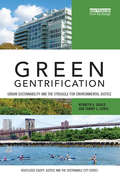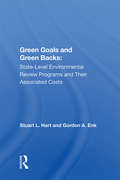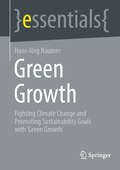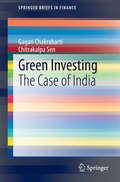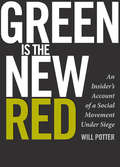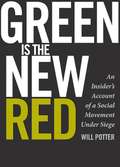- Table View
- List View
Green Energy: Meta-analysis of the Research Results (Green Energy and Technology)
by Iwona Bąk Katarzyna ChebaThis book presents novel research that represents a multidimensional approach to green energy. Each chapter addresses its subject from diverse perspectives, including financial, technological, and social. The results shown also consider various approaches to the collection and processing of data on green energy. The book also reports on analyses of data from official records and databases, as well as the analysis of primary data obtained directly. The book will be of interest to those working in green energy as well as researchers interested in the methods of scientific research.
Green Finance in China: Policies, Experiences and Challenges (Contributions to Finance and Accounting)
by Wenting Zhang Dawei ZhaoThis book aims to provide first-hand information for readers concerned with green finance and sustainable development by summarizing the unique features, policies and practical innovations of green finance development in China and hoping to provide China's experience in the development of green finance for more regions. The global economy is currently facing historic opportunities that brings by a new round of technology, energy and industrial revolution. The new growth path of "green and low-carbon" development has become the main direction of the transformation of global economic development. What's China's green finance strategy? How does China deliver on the goal? This book builds an overview of China's green finance and sheds light on sustainable development topics from finance perspective.
Green Finance, Sustainable Development and the Belt and Road Initiative (Routledge Studies on Asia in the World)
by Fanny M. Cheung Ying-yi HongCan China’s Belt and Road Initiative (BRI) promote sustainable development, alongside its primary aims of increasing commercial connectivity with China’s partners? In discussions of the BRI the focus has tended to be on the implications for infrastructure construction, connectivity, and economic diplomacy. Rather less attention has been paid to its potential impact on sustainability. The initiative has not only set principles to prevent climate change and promote sustainable development, but also pledged to align with the UN’s environmental objectives. The contributors to this volume describe and evaluate the consequent policy coordination in the areas of green finance, green energy, and sustainable development in the Belt and Road regions. They examine both the challenges and opportunities of these projects, and the role that Hong Kong can play in supporting their assessment, finance, and implementation. With contributions from authors based in mainland China, Hong Kong, Australia, Qatar, the UK, and the US – with experience in corporate social responsibility, international finance, environmental policy, and international relations – this book presents a thorough and rigorous analysis of the green side of the BRI. A valuable resource for scholars of the BRI and its many implications for China, its partners, and the development of sustainable infrastructure.
Green Fraud: Why the Green New Deal Is Even Worse than You Think
by Marc Morano"If you care about America's future, read this book."—Mark Levin "A must-read book that shows how the Green New Deal is dangerous, impractical, misguided, and guaranteed to fail with disastrous results for the American people.&”—Sean Hannity A New Lockdown to "Save" the Climate That&’s what&’s in store for us if Alexandria Ocasio-Cortez and the Democrats pass their radical climate plan—the Green New Deal. It is packed with guarantees so completely irrelevant to the problem it purports to &“solve&” (like &“free college&” and incomes for everyone &“unable or unwilling to work&”) that even its boosters have admitted it&’s not really about the climate. The intrepid Marc Morano, author of the bestselling Politically Incorrect Guide to Climate Change, breaks down the science and the politics to expose the truth about the Green New Deal: • The science is settled: copious evidence—and prominent defections from the &“climate consensus&”—make clear we are not facing a man-made climate disaster • &“Climate change&” is the perfect Trojan horse for the socialist agenda of the Left • Fossil fuels lifted the West out of poverty—but our elites now want to deny them to the world&’s poor • The Green New Deal is on a collision course with self-government and our fundamental rights Climate change has already been &“solved&” multiple times over the past two decades—with highly touted international agreements—and yet it never goes away as an excuse for leftist policies that will cripple our economy, impoverish the world, and take away our freedoms. Packed with telling statistics, damning quotations, and real science, Green Fraud is your source for all the facts you need to understand—and resist—the threat.
Green Futures: Navigating the Path to Environmental Resilience (Approaches to Global Sustainability, Markets, and Governance)
by Angappa Gunasekaran Debjani Mukherjee Vinay Kandpal Anshuman JaswalThis book presents a comprehensive examination of the complex journey toward achieving environmental resilience in the twenty-first century. It brings together leading voices from various fields to showcase the challenges and promising solutions in sustainability and green futures. Organized into thematic divisions, each chapter presents a different facet of environmental resilience, offering incisive analysis, creative techniques, and case studies from around the globe. The book explores the complex intersections of environmental, social, and economic elements, including climate change mitigation and adaptation, sustainable urban development, biodiversity conservation, and renewable energy technology. Contributions from distinguished scholars, policymakers, activists, and practitioners encourage interdisciplinary discourse and collaboration to address urgent environmental challenges. The book inspires readers to envision and actively contribute to a more sustainable and resilient future through rigorous research, visionary thinking, and practical ideas. Combining intellectual rigor with approachable prose, this book serves as an invaluable resource for students, scholars, policymakers, and anyone committed to creating a greener and more resilient society. It provides vital information and inspiration for navigating the path toward environmental resilience, whether dealing with the complexity of climate change, seeking innovative solutions for sustainable development, or advocating for environmental justice.
Green Gentrification and Environmental Injustice: A Complexity Approach to Policy
by Heather E. Campbell Yushim Kim Adam EckerdThis book argues that, given the complex nature of the urban environment, we cannot find one optimal solution to reducing environmental injustice, in part because there is no singular cause. Environmental injustice emerges in particular settings because of the combined and interdependent effects of a variety of different policy and community characteristics. The authors argue that addressing these interlinked problems requires an understanding of the clusters of community and contextual factors that combine in a variety of ways to both create problems and imply policy approaches to managing them. They argue for the use of complexity-informed methods to assist in making public policy choices, such as Qualitative Comparative Analysis (QCA) and Agent-based Modeling (ABM), to enable us to better identify plausible solutions for specific contexts. This volume offers a new perspective for strategically managing urban policy that considers the risk of gentrification and gentrification-related displacement, with the ultimate goal of improving social justice. Environmental injustice, pollution remediation, gentrification, and displacement are interlinked problems, all of which impinge on social justice in US cities. However, public policy research, and often practice as well, has tended to separately consider urban policy issues such as environmental injustice, brownfields and other pollution remediation, how to redevelop neighborhoods, and how to contend with gentrification and displacement. In this book the authors take a new perspective to such intertwined urban policy issues, using complexity thinking and, more importantly, complex adaptive systems approaches, in order to develop context-sensitive policy approaches to managing these ongoing problems.
Green Gentrification: Urban sustainability and the struggle for environmental justice (Routledge Equity, Justice and the Sustainable City series)
by Tammy L. Lewis Kenneth A. GouldGreen Gentrification looks at the social consequences of urban "greening" from an environmental justice and sustainable development perspective. Through a comparative examination of five cases of urban greening in Brooklyn, New York, it demonstrates that such initiatives, while positive for the environment, tend to increase inequality and thus undermine the social pillar of sustainable development. Although greening is ostensibly intended to improve environmental conditions in neighborhoods, it generates green gentrification that pushes out the working-class, and people of color, and attracts white, wealthier in-migrants. Simply put, urban greening "richens and whitens," remaking the city for the sustainability class. Without equity-oriented public policy intervention, urban greening is negatively redistributive in global cities. This book argues that environmental injustice outcomes are not inevitable. Early public policy interventions aimed at neighborhood stabilization can create more just sustainability outcomes. It highlights the negative social consequences of green growth coalition efforts to green the global city, and suggests policy choices to address them. The book applies the lessons learned from green gentrification in Brooklyn to urban greening initiatives globally. It offers comparison with other greening global cities. This is a timely and original book for all those studying environmental justice, urban planning, environmental sociology, and sustainable development as well as urban environmental activists, city planners and policy makers interested in issues of urban greening and gentrification.
Green Goals And Green Backs: State-level Environmental Review Programs And Their Associated Costs
by Stuart L HartSince the signing of the National Environmental Policy Act (NEPA) on January 1, 1970, eighteen states have initiated their own programs of compre-hensive environmental review. These State Environ-mental Policy Acts (SEPA's), or "NEPA equivalents," &re generally patterned after the policies, goals, and processes established by NEPA but, at the same time, demonstrate a great deal of variability in terms of extent as well as style of implementation. They are "equivalent," however, in the sense that they all utilize a similar tool--the environmental impact statement (EIS).
Green Gold: Contested Meanings and Socio-Environmental Change in Argentine Yerba Mate Cultivation (SpringerBriefs in Latin American Studies)
by Adam S. DohrenwendThis book applies an approach to study the externalization of cost under capitalism in the production of Argentine yerba mate, an infusion with stimulant properties long used by indigenous peoples. Consumption in today’s globalized economy makes it difficult to understand the consequences of our actions across the globe. A political-ecological lens, informed by the work of Robert Sack and Ian Cook, can help guide an analysis that geographically reconstructs supply chains and reveal the realities of consumption. The use of yerba mate has become a cornerstone of Argentine society and identity, and yerba mate processors are working to expand exports globally. In Argentina’s Misiones Province, the heart of yerba mate production, the true costs of production are borne by the children, the impoverished laborers, and the environment of Argentina’s Atlantic Rainforest. These consequences of modernity, along with the efforts of an NGO to remedy them, are presented and assessed.
Green Gold: The Avocado's Remarkable Journey from Humble Superfood to Toast of a Nation
by Sarah Allaback Monique F. ParsonsA lively and engrossing cultural history of the avocado and the people who transformed it into an American obsession &“Whether you&’re a history buff or just enjoy a chip full of guacamole, you&’ll be thoroughly captivated . . . Green Gold is a well researched, captivating story.&” —Rick Bayless, James Beard Award-winning chef, author, and restaurateurThe avocado is the quintessential symbol of aspirational living, a ubiquitous agricultural favorite, and the driver of an $18 billion global industry. How did this regional Latin American staple become a star of Super Bowl ads and a byword for wellness? Documenting more than a century of cross-cultural cooperation, cutting-edge science, and savvy marketing, Green Gold tells the remarkable story of the fruit&’s rise to prominence as both a culinary and cultural juggernaut.Anchored by the story of two exceptional trees that stood out among hundreds of rivals, Green Gold is a spirited and often surprising behind-the-scenes look at how dedicated avocado enthusiasts in Mexico and California developed an ideal fruit to sell to the world. Navigating the Depression, two world wars, Mexican revolutions, violent drug lords, drought, and disease, these pioneers were driven by the avocado&’s potential to captivate the palates and hearts of consumers across the globe. Their efforts, inspired by the success of California citrus, launched today&’s lucrative industry and helped the avocado win a place among such supermarket staples as oranges and bananas.Set against the rise of Southern California as an economic and cultural powerhouse and featuring delightful recipes (including vintage versions of guacamole and avocado toast), Green Gold is an entertaining and far-ranging exploration of the avocado&’s journey to a central place in the American diet and global imagination.
Green Gone Wrong
by Heather RogersIn Green Gone Wrong environmental writer Heather Rogers blasts through the marketing buzz of big corporations and asks a simple question: Do today's much-touted "green" products--carbon offsets, organic food, biofuels, and eco-friendly cars and homes--really work? Implicit in efforts to go green is the promise that global warming can be stopped by swapping out dirty goods for "clean" ones. But can earth-friendly products really save the planet? This far-reaching, riveting narrative explores how the most readily available solutions to environmental crisis may be disastrously off the mark. Rogers travels the world tracking how the conversion from a "petro" to a "green" society affects the most fundamental aspects of life--food, shelter, and transportation. Reporting from some of the most remote places on earth, Rogers uncovers shocking results that include massive clear-cutting, destruction of native ecosystems, and grinding poverty. Relying simply on market forces, people with good intentions wanting to just "do something" to help the planet are left feeling confused and powerless.Green Gone Wrong reveals a fuller story, taking the reader into forests, fields, factories, and boardrooms around the world to draw out the unintended consequences, inherent obstacles, and successes of eco-friendly consumption. What do the labels "USDA Certified Organic" and "Fair Trade" really mean on a vast South American export-driven organic farm? A superlow-energy "eco-village" in Germany's Black Forest demonstrates that green homes dramatically shrink energy use, so why aren't we using this technology in America? The decisions made in Detroit's executive suites have kept Americans driving gas-guzzling automobiles for decades, even as U.S. automakers have European models that clock twice the mpg. Why won't they sell these cars domestically? And what does carbon offsetting really mean when projects can so easily fail? In one case thousands of trees planted in drought-plagued Southern India withered and died, releasing any CO2 they were meant to neutralize. Expertly reported, this gripping exposé pieces together a global picture of what's happening in the name of today's environmentalism. Green Gone Wrong speaks to anyone interested in climate change and the future of the natural world, as well as those who want to act but are caught not knowing who, or what, to believe to protect the planet. Rogers casts a sober eye on what's working and what's not, fearlessly pushing ahead the debate over how to protect the planet.
Green Gone Wrong: How Our Economy Is Undermining the Environmental Revolution
by Heather RogersIn Green Gone Wrong environmental writer Heather Rogers blasts through the marketing buzz of big corporations and asks a simple question: Do today’s much-touted "green" products—carbon offsets, organic food, biofuels, and eco-friendly cars and homes—really work? Implicit in efforts to go green is the promise that global warming can be stopped by swapping out dirty goods for "clean" ones. But can earth-friendly products really save the planet? This far-reaching, riveting narrative explores how the most readily available solutions to environmental crisis may be disastrously off the mark. Rogers travels the world tracking how the conversion from a "petro" to a "green" society affects the most fundamental aspects of life—food, shelter, and transportation. Reporting from some of the most remote places on earth, Rogers uncovers shocking results that include massive clear-cutting, destruction of native ecosystems, and grinding poverty. Relying simply on market forces, people with good intentions wanting to just "do something" to help the planet are left feeling confused and powerless.Green Gone Wrong reveals a fuller story, taking the reader into forests, fields, factories, and boardrooms around the world to draw out the unintended consequences, inherent obstacles, and successes of eco-friendly consumption. What do the labels "USDA Certified Organic" and "Fair Trade" really mean on a vast South American export-driven organic farm? A superlow-energy "eco-village" in Germany’s Black Forest demonstrates that green homes dramatically shrink energy use, so why aren’t we using this technology in America? The decisions made in Detroit’s executive suites have kept Americans driving gas-guzzling automobiles for decades, even as U.S. automakers have European models that clock twice the mpg. Why won’t they sell these cars domestically? And what does carbon offsetting really mean when projects can so easily fail? In one case thousands of trees planted in drought-plagued Southern India withered and died, releasing any CO2 they were meant to neutralize. Expertly reported, this gripping exposé pieces together a global picture of what’s happening in the name of today’s environmentalism. Green Gone Wrong speaks to anyone interested in climate change and the future of the natural world, as well as those who want to act but are caught not knowing who, or what, to believe to protect the planet. Rogers casts a sober eye on what’s working and what’s not, fearlessly pushing ahead the debate over how to protect the planet.
Green Governance
by David Bollier Burns H. WestonThe vast majority of the world's scientists agree: we have reached a point in history where we are in grave danger of destroying Earth's life-sustaining capacity. But our attempts to protect natural ecosystems are increasingly ineffective because our very conception of the problem is limited; we treat "the environment" as its own separate realm, taking for granted prevailing but outmoded conceptions of economics, national sovereignty, and international law. Green Governance is a direct response to the mounting calls for a paradigm shift in the way humans relate to the natural environment. It opens the door to a new set of solutions by proposing a compelling new synthesis of environmental protection based on broader notions of economics and human rights and on commons-based governance. Going beyond speculative abstractions, the book proposes a new architecture of environmental law and public policy that is as practical as it is theoretically sound.
Green Grades: Can Information Save the Earth?
by Graham BullockA comprehensive assessment and analysis of the validity, trustworthiness, and effectiveness, of such environmental ratings as ENERGY STAR, LEED, and USDA Organic. Consumers are confronted with a confusing array of environmental ratings on products that range from refrigerators to shampoos. Is the information that these ratings represent trustworthy, accurate, or even relevant to environmental concerns? “Information optimists” believe that these “green grades” can play an important role in saving the planet. “Information pessimists” consider them a distraction from pursuing legislative and regulatory actions. In this book, Graham Bullock offers a comprehensive assessment and analysis of the effectiveness and validity of such environmental ratings as ENERGY STAR, USDA Organic, the Forest Stewardship Council, LEED, and the Toxic 100 Air Polluters Index. Bullock stakes out a position as an “information realist,” acknowledging both the contributions and the limitations of these initiatives. Drawing on interviews, case studies, and an original dataset of 245 environmental ratings and certifications, he examines what he calls the information value chain of green grades: organizational associations, content, methods, interfaces, and outcomes. He explores the relevance of the information to the issues; the legitimacy and accountability of sponsoring or cooperating organizations; the reliability of methods used to develop the information; the prominence and intelligibility of communication to the public; and the effects and effectiveness of the information after it emerges from the value chain. Bullock's analysis offers a realistic appraisal of the role of information-based environmental governance—its benefits and shortcomings—and its relation to other governance strategies.
Green Growth: Fighting Climate Change and Promoting Sustainability Goals with 'Green Growth' (essentials)
by Hans-Jörg NaumerIn this Springer essential, you will learn how market-driven methods, innovations, and investments can achieve "Green Growth" without forgetting the needs of the three billion people who already lack these essentials today. In the context of sustainability goals, the differences between "Green Growth" and "Degrowth" are explained, and why climate change cannot be stopped with a "war economy". Instead, the environment must be given a price tag. Through "Finance For Future", there is a chance to change the world for the better through one's own investments. A win-win-win situation for the environment, investors, and the economy. The author donates the proceeds from the sales to Hessen-Forst.
Green Hell: How Environmentalists Plan To Control Your Life And What You Can Do To Stop Them
by Steven MilloyBig Brother Has Turned GreenThe environmental movement has cultivated a warm and fuzzy public image, but behind the smiley-face rhetoric of "sustainability" and "conservation" lies a dark agenda. The Greens aim to regulate your behavior, downsize your lifestyle, and invade the most intimate aspects of your personal life.In this stunning exposé, Steve Milloy unveils the authoritarian impulse underlying the Green crusade. Whether they're demanding that you turn down your thermostat, stop driving your car, or engage in some other senseless act of self-denial, the Greens are envisioning a grim future for you marked by endless privation.Steamrolling nearly all opposition with its apocalyptic predictions of environmental doom, the Green movement has gained influence throughout American society--from schools and local planning boards to the biggest corporations in the country. And their plans are much more ambitious than you think, says Milloy. What the Greens really seek, with increasing success, is to dictate the very parameters of your daily life--where you can live, what transportation you can use, what you can eat, and even how many children you can have.Citing the tactics and goals of Green groups as explained by their own activists and leaders, Green Hell demonstrates:* How Green pressure campaigns threaten the safety of your home and your car, and public health overall* Why the election of President Obama portends a giant leap forward for coercive Green policies* Why Greens obstruct the use of all forms of energy--even the renewable sources they tout to the public* How wealthy Green elites stand to profit fabulously from the restrictions and regulations they seek to impose on the rest of us* How Green pressure campaigns are hamstringing the military and endangering our national security* Why big business is not only knuckling under to the Greens, but is aggressively promoting the green agenda to the detriment of its own stockholders* What you can do to help stop the great Green machineA one-of-a-kind, comprehensive takedown of the entire environmental movement, Green Hell will open your eyes to a looming threat to our economy, our civil liberties, and the entire American way of life.
Green Hydrogen in Power Systems (Green Energy and Technology)
by Behnam Mohammadi-Ivatloo Vahid Vahidinasab Jeng Shiun LimGreen Hydrogen in Power Systems examines state-of-the-art applications and the latest developments in technology, protocols, implementation, and application of green hydrogen in power and energy systems. The first book to comprehensively analyze the opportunities and challenges in this field, it brings together global experts from different disciplines to provide a comprehensive study of the role of green hydrogen in power systems of the future and its important role in energy evolution and decarbonization efforts around the world. The book is a multidisciplinary reference for researchers and industry stakeholders who have focused on the field of hydrogen integration into the power and energy systems, as well as researchers and developers from different branches of engineering, energy, computer sciences, data, economic, and operation research fields.
Green Infrastructure for Sustainable Urban Development in Africa
by John AbbottThis book shows for the first time how green infrastructure can work in an African urban context. On one level it provides a major rethinking of the role of infrastructure in urban society since the creation of networked infrastructure in the early twentieth century. On another, it explores the changing paradigms of urban development through the fundamental question of how decisions are made. With a focus on Africa's fast-growing secondary towns, where 70 per cent of the urban population live, the book explains how urban infrastructure provides the key to the relationship between economic development and social equity, through the mediation of natural resources. Adopting this view enables investment to be channelled more effectively to provide the engine for economic growth, while providing equitable services for all residents. At the same time, the mediation of resource flows integrates the metabolism of the city into the wider ecosystem. This vision leads to a new way of thinking about infrastructure, giving clear definition to the concept of green infrastructure. On the basis of research gathered throughout an extensive career, John Abbott draws in particular from his experience in Ethiopia to demonstrate the ways in which infrastructure needs to respond to the economies, societies and natural environments of twenty-first century urban Africa.
Green Infrastructure: Linking Landscapes and Communities
by Edward T. Mcmahon Lydia Bergen Mark A. Benedict Mark A. The Conservation FundWith illustrative and detailed examples drawn from throughout the country, Green Infrastructure advances smart land conservation: large scale thinking and integrated action to plan, protect and manage our natural and restored lands. From the individual parcel to the multi-state region, Green Infrastructure helps each of us look at the landscape in relation to the many uses it could serve, for nature and people, and determine which use makes the most sense. In this wide-ranging primer, leading experts in the field provide a detailed how-to for planners, designers, landscape architects, and citizen activists
Green Innovation in China
by Joanna I LewisAs the greatest coal producing and consuming nation in the world, China would seem an unlikely haven for wind power. Yet the country now boasts a world-class industry that promises to make low-carbon technology more affordable and available to all. Conducting an empirical study of China's remarkable transition and the possibility of replicating their model elsewhere, Joanna I. Lewis adds greater depth to a theoretical understanding of China's technological innovation systems and the country's current and future role in a globalized economy.Lewis focuses on China's specific methods of international technology transfer, its forms of international cooperation and competition, and its implementation of effective policies that promoted the development of a home-grown industry. Just a decade ago, China claimed only a handful of operating wind turbines-all imported from Europe and the United States. Today, the country is the largest wind power market in the world, with turbines made almost exclusively in its own factories. Studying this shift reveals how China's political leaders have responded to domestic energy challenges and how they may confront climate change. The nation's ability to escalate its use of wind power also demonstrates China's ability to leapfrog to cleaner energy technologies-a path equally viable for other developing countries hoping to bypass gradual industrialization and the "technological lock-in" of hydrocarbon-intensive energy infrastructure. Though setbacks are possible, China could come to dominate global wind turbine sales, becoming a hub of technological innovation and a major instigator of low-carbon economic change.
Green Innovation in China: China's Wind Power Industry and the Global Transition to a Low-Carbon Economy (Contemporary Asia in the World)
by Joanna LewisAs the greatest coal-producing and consuming nation in the world, China would seem an unlikely haven for wind power. Yet the country now boasts a world-class industry that promises to make low-carbon technology more affordable and available to all. Conducting an empirical study of China's remarkable transition and the possibility of replicating their model elsewhere, Joanna I. Lewis adds greater depth to a theoretical understanding of China's technological innovation systems and its current and future role in a globalized economy. Lewis focuses on China's specific methods of international technology transfer, its forms of international cooperation and competition, and its implementation of effective policies promoting the development of a home-grown industry. Just a decade ago, China maintained only a handful of operating wind turbines—all imported from Europe and the United States. Today, the country is the largest wind power market in the world, with turbines made almost exclusively in its own factories. Following this shift reveals how China's political leaders have responded to domestic energy challenges and how they may confront encroaching climate change. The nation's escalation of its wind power use also demonstrates China's ability to leapfrog to cleaner energy technologies—an option equally viable for other developing countries hoping to bypass gradual industrialization and the "technological lock-in" of hydrocarbon-intensive energy infrastructure. Though setbacks are possible, China could one day come to dominate global wind turbine sales, becoming a hub of technological innovation and a major instigator of low-carbon economic change.
Green Inside Activism for Sustainable Development
by Jan Olsson Erik HysingThis book considers how public sector institutions can be transformed to better support sustainable development by exploring the concept of green inside activism and its importance for institutional change. The phenomenon of inside activism has been shown to be crucial for green policy change and this book focuses on public officials as green inside activists, committed to green values and engaged in social movement, acting strategically from inside public administration to change public policy and institutions in line with such value commitment. The book theorizes how green inside activism can contribute to a more sustainable development through institutional change. This theorizing builds on and relates to highly relevant theoretical arguments in the existing literature. The authors also consider the legitimacy of inside activism and how it can be reconciled with democratic ideals. This innovative work will appeal to students and scholars of public policy, political science and environmental politics.
Green Investing
by Chitrakalpa Sen Gagari ChakrabartiThis book seeks to answer the essential question of the investment-worthiness of green instruments. It is evident that investing in green and energy-efficient firms will be the most profitable choice for wise investors in the years to come. The reconciliation of the social choice for green technology and investors' choice for gray technology will be automatically achieved once green firms become more profitable than gray ones, in the Indian context. As there has been very little research done in this area, especially in the Indian context, this book addresses that gap. In order to do so, it follows the development of five different portfolios consisting of 100% green, 75% green-25% gray, 50% green-50% gray, 25% green-75% gray and 100% gray stocks, and attempts to answer questions such as: Do green portfolios entail less relative own-risk as compared to their gray counterparts? How effectively do green portfolios avoid market risk? Are green portfolios inherently more stable? Do green portfolios have a higher probability of surviving a financial crisis? Is the performance of green portfolios backed by their fundamentals? Is there any particular technical trading strategy that can ensure a consistently above-average return from these portfolios?
Green Is the New Red
by Will PotterAt a time when everyone is going green, most people are unaware that the FBI is using anti-terrorism resources to target environmentalists. Here is a guided tour into an underground world of radical activism and an introduction to the shadowy figures behind the headlines. But here also is the story of how everyday people are prevented from speaking up for what they believe in. Like the Red Scare, this "Green Scare" is about fear and intimidation, and Will Potter outlines the political, legal, and public relations strategies that threaten even acts of nonviolent civil disobedience with the label of "eco-terrorism."
Green Is the New Red: An Insider's Account of a Social Movement Under Siege
by Will PotterAn insider tells how environmentalists and animal rights activists have become "the number one domestic terrorism threat."






